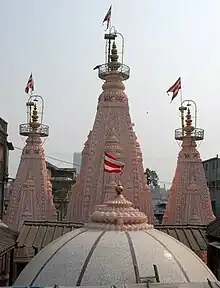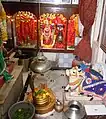Shri Swaminarayan Mandir, Mumbai
Shri Swaminarayan Mandir, Mumbai (Marathi: श्री स्वामीनारायण मंदिर, मुंबई) is a Hindu temple (Mandir) and a part of the Swaminarayan Sampraday. This Swaminarayan Temple is located in the Bhuleshwar area of Mumbai and is the oldest Swaminarayan Mandir in Mumbai, being over a hundred years old.[1][2]
| Shri Swaminarayan Mandir | |
|---|---|
श्री स्वामीनारायण मंदिर | |
 The Three Spires and dome of the Sabha Mandap atop the temple | |
| Religion | |
| Affiliation | Hinduism |
| District | Mumbai City |
| Deity | Laxminarayan Dev, Radha Krishna Dev |
| Location | |
| Location | Mumbai |
| State | Maharashtra |
| Country | India |
 Location within Mumbai | |
| Geographic coordinates | 18°57′14.31″N 72°49′48.78″E |
| Architecture | |
| Creator | Swaminarayan Sampraday |
| Completed | 1868 |
The present Mandir has a tri - spire structure and the Murtis installed are that of Laxminarayan Dev with Ghanshyam Maharaj, and Radha Krishna Dev with Hari Krishna Maharaj. In this temple, Radha Krishna are worshipped in the form of Radha Golokvihari as they are the residents of Goloka. It is a Shikharband Mandir and comes under the Laxminarayan Dev Gadi (Vadtal).[3] This temple is one of many in the Bhuleshwar area that led to the birth of Phool Galli (or flower market) in Bhuleshwar due to the high demand of flowers in these temples.[4]
History
On Vaishakh Shukla Ekadashi, 1868, Ranchhoddas Pranjeevandas built the first ever Shree Swaminarayan temple in Mumbai by breaking and rebuilding his own residence.[5] The deities of Hari Krishna Maharaj, Gaulokvihari and Radhika were instated by Acharya Maharaj Bhagwatprasadji Maharaj.[5]
Tri-spire temple
The present tri-spire temple structure was built and the deities of Ghanshyam Maharaj and Lakshminarayan Dev instated on the occasion of Vaishakh Shukla Dwadashi, 1903 by Acharya Maharaj Lakshmiprasadji Maharaj.[5]
Swaminarayan's devotee, Rao Bahadur Sheth Curumsey Damjee contributed towards this temple's reinstatement with all material, physical and intellectual resources. His close associate and friend Shree Mathurdas Vaishnav too donated Rs. 25,000/- towards this work.[5]
Structure
The Swaminarayan temple at Bhuleshwar has an elaborately carved frontage which is really a visual treat in an otherwise shabby surrounding. There are twenty five steps leading to the audience hall (Sabhamandap). There are the shrines dedicated to Ganesha and Hanuman on the left and right of the audience hall. There are three main shrines. In the shrine on the east there are idols of Hari Krishna Maharaj, Gaulokvihari and Radhika; the shrine at the centre has the idols of Ghanashyam Maharaj, Narayan and Laxmi; while the shrine on the west houses the resting place for deities. Over the Sabhamandap is a dome upon which are painted the scenes from the Krishnalila (Sports of Krishna). The dome is supported by fifty four pillars.[3] There is a big audience hall on the first floor where religious discourses are held regularly.
Festivals
The festivities celebrated at the temple are Ram Navami/Swaminarayan Jayanti, Janmashtami, Vaman Jayanti, Nrisinha Jayanti, Mahashivratri, Ganesh Chaturthi, etc.[3] Apart from these, the festival of Hindola is also celebrated as part of festivities during the month of Shravan in the Indian Calendar.[6]
Images
 Image Hari Krishna with Gaulokvihari and Radhika in the western sanctum
Image Hari Krishna with Gaulokvihari and Radhika in the western sanctum Image of Ghanshyam with Lakshmi Narayan in the central sanctum
Image of Ghanshyam with Lakshmi Narayan in the central sanctum Image of Ganesha on the left of the entrance
Image of Ganesha on the left of the entrance Image of the Shiv Ling at the temple
Image of the Shiv Ling at the temple Image of Hanuman in the form of Kastbhanjan on the right of the entrance
Image of Hanuman in the form of Kastbhanjan on the right of the entrance Ornately carved interior
Ornately carved interior Krishna Lila on the dome of Main Sabha Mandap
Krishna Lila on the dome of Main Sabha Mandap Sabha Mandap or audience hall on the first floor
Sabha Mandap or audience hall on the first floor
See also
References
- "Shri Swaminarayan Mandirs - Mumbai".
- James Mackenzie Maclean (1889). Guide to Bombay. "Bombay gazette" steam press. p. 301.
- "Maharashtra State Gazettes, Greater Bombay District: Swaminarayan Temple Bhuleshwar".
- "Flower therapy". Indian Express. 11 June 2006. Retrieved 5 September 2009.
- "Shri Swaminarayan Mandir, Mumbai". Archived from the original on 4 July 2007.
- "Mumbai Notes: Shravan festival celebrations". Indian Express. 25 July 1998. Retrieved 12 October 2008.


